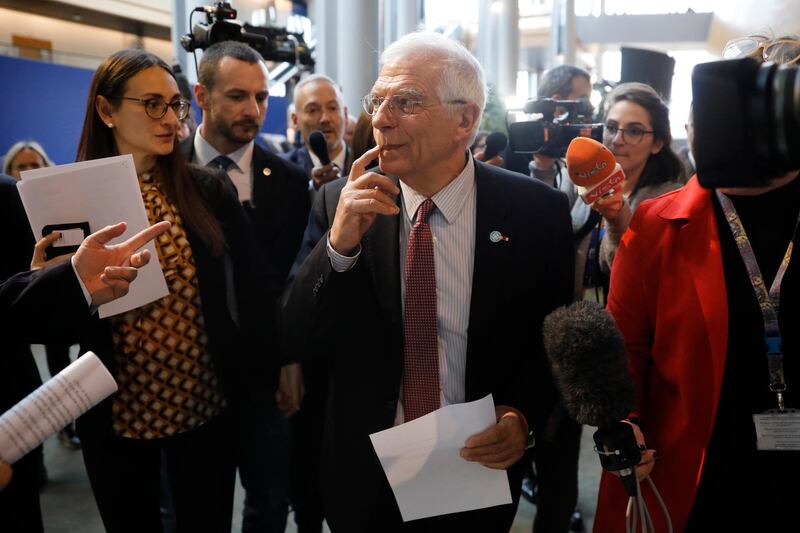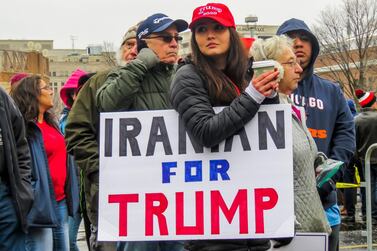European powers have triggered the dispute process in the 2015 nuclear deal with Iran after Tehran’s failure to comply with the agreement.
France, the UK and Germany accused the Iranian regime of continuously violating “key” restrictions of the Joint Comprehensive Plan of Action, which set clear limits on Iran’s efforts to develop its nuclear capabilities. In a joint statement the powers said they had “no choice, given Iran’s actions” to refer the case to the dispute resolution mechanism.
“Iran’s actions are inconsistent with the provisions of the nuclear agreement and have increasingly severe and non-reversible proliferation implications,” a statement by the three countries known as the E3 said.
I have received a letter from E3 FMs triggering the dispute resolution mechanism of #JCPOA with Iran. Will now oversee the process which requires intensive efforts& approach in good faith by all. Preserving the #nucleardeal is now more important than ever. https://t.co/JkL92WI8fg
— Josep Borrell Fontelles (@JosepBorrellF) January 14, 2020
Germany foreign minister Heiko Maas said the E3 "could no longer leave the growing Iranian violations of the nuclear agreement unanswered”.
European Union foreign affairs chief Josep Borrell, who is chair of the nuclear deal, said the E3 move was not designed to re-impose UN sanctions but to bring Tehran back into compliance.
"In light of the ongoing dangerous escalations in the Middle East, the preservation of the JCPoA is now more important than ever," he added.
The mechanism allows two weeks for ministers to resolve any problems, although that period can be extended if all sides agree. If needed, an advisory board would have an extra 20 days to adjudicate.
Speaking to parliament, Foreign Secretary Dominic Raab said Britain and its allies were "fully open to a broader initiative" that addressed not only Tehran's nuclear ambitions but also its wider activities destabilising the region and detention of dual nationals. He told MPs that Iran faced a choice and that its political and economic isolation could only deepen if they didn’t engage.
Iran's Foreign Ministry warned of a "serious and strong response" to the European move.
However, Foreign Ministry spokesman Abbas Mousavi said Iran was is "fully ready to answer any good will and constructive effort" that preserves the nuclear deal IRNA news agency reported.
The decision by the E3 to trigger the dispute process came despite concerns that it could lead to the collapse of the entire nuclear deal, Dr Aniseh Bassiri Tabrizi, an Iran expert at the Royal United Services Institute told The National.
It is vital #Iran never acquires a nuclear weapon. Today, the UK, France and Germany have initiated the dispute resolution mechanism in response to Iran breaking its commitments in the JCPOA nuclear deal. We want to bring Iran back into full compliance and preserve the deal. https://t.co/ptaqGXVerH
— Dominic Raab (@DominicRaab) January 14, 2020
President Hassan Rouhani announced in May 2019 that Iran’s nuclear activities would no longer be bound by the limits imposed the deal and every two months has reduced its compliance in an effort to pressure the EU to relieve sanctions.
The latest unilateral easing of controls announced by Iran - following the killing of Qassem Suleimani - included abandoning all limits on uranium enrichment. The move was considered as the “last straw” for the Europeans.
“The only reason there was a bit of hesitation about this was the uncertainty and risk that the JCPOA will collapse as a consequence,” she said.
“It’s been part of Iran’s strategy since May 2019. What Iran did was seen from their point of view as an olive branch,” in a reference to Iran not immediately removing all its enriching restrictions when it began violating the JCPoA last summer as it sought a European workaround from US sanctions.
She said Iran had left the ball in the court of the EU to decide how to respond while saying it was ready to go back to full compliance as long as it received economic benefits.
“Instead of responding the way the Iranians wanted … they [the E3] didn’t read the steps Iran took in the same way.”
Ryan Bohl, from geopolitical intelligence firm Stratfor, said there was likely a strategic dimension to the move because the “E3 want to get the US and Iran talking to avoid a regional conflict, but can’t seem to get them to a table”.
But he also said the E3 wanted to see how Iran would react as the threat of sanctions remained as they tried to resolve the dispute.
"They don't want to go hard on sanctions immediately, so they're likely to draw this out for a while to pressure Iran without imposing yet more sanctions on them," he told The National.
“For the E3, it’s about the threat of sanctions right now. They’ll test Iran’s reaction and then decide what to do next."
Mr Bohl said the move would be welcomed by the White House, which had “been lobbying the Europeans to do this for a long time”.
Despite Mr Trump urging the E3 to withdraw from the “remnants” of the JCPoA, the three countries said their “overarching objective” remained to preserve the pact and “way forward to resolve the impasse through constructive diplomatic dialogue”.
“In doing so, our three countries are not joining a campaign to implement maximum pressure against Iran. Our hope is to bring Iran back into full compliance with its commitments under the JCPoA,” they said.
The E3 said they had made it clear on December 6 they would be forced to take action via the dispute resolution mechanism unless Iran reversed its actions.








